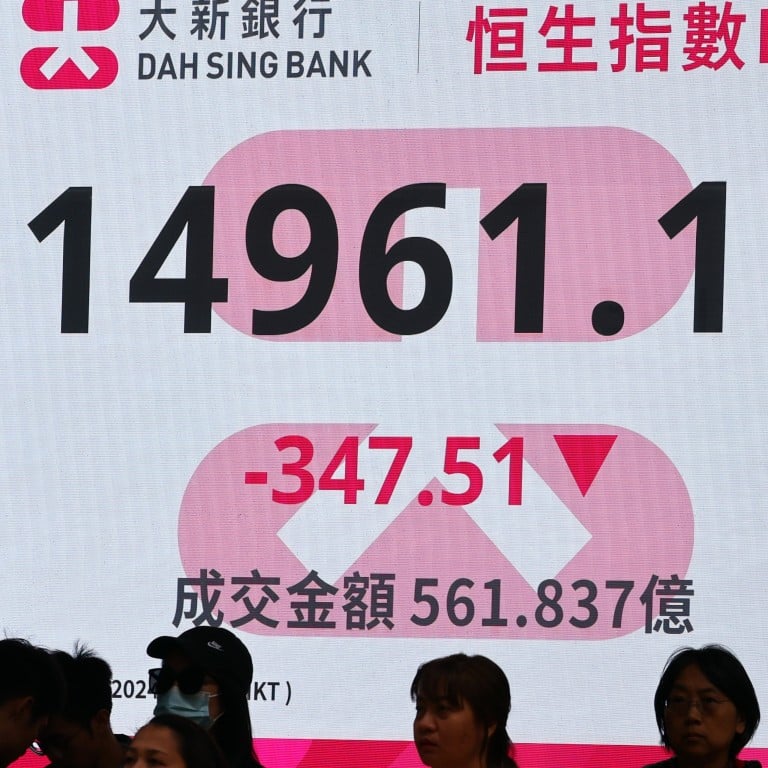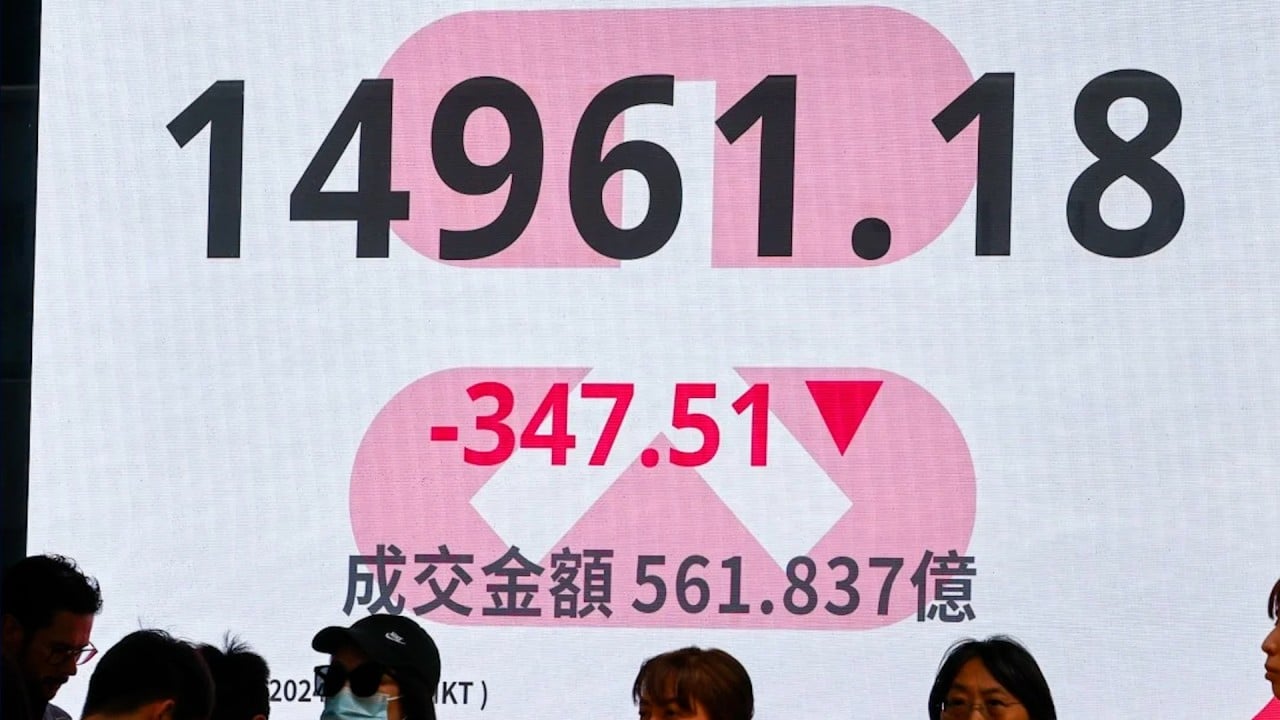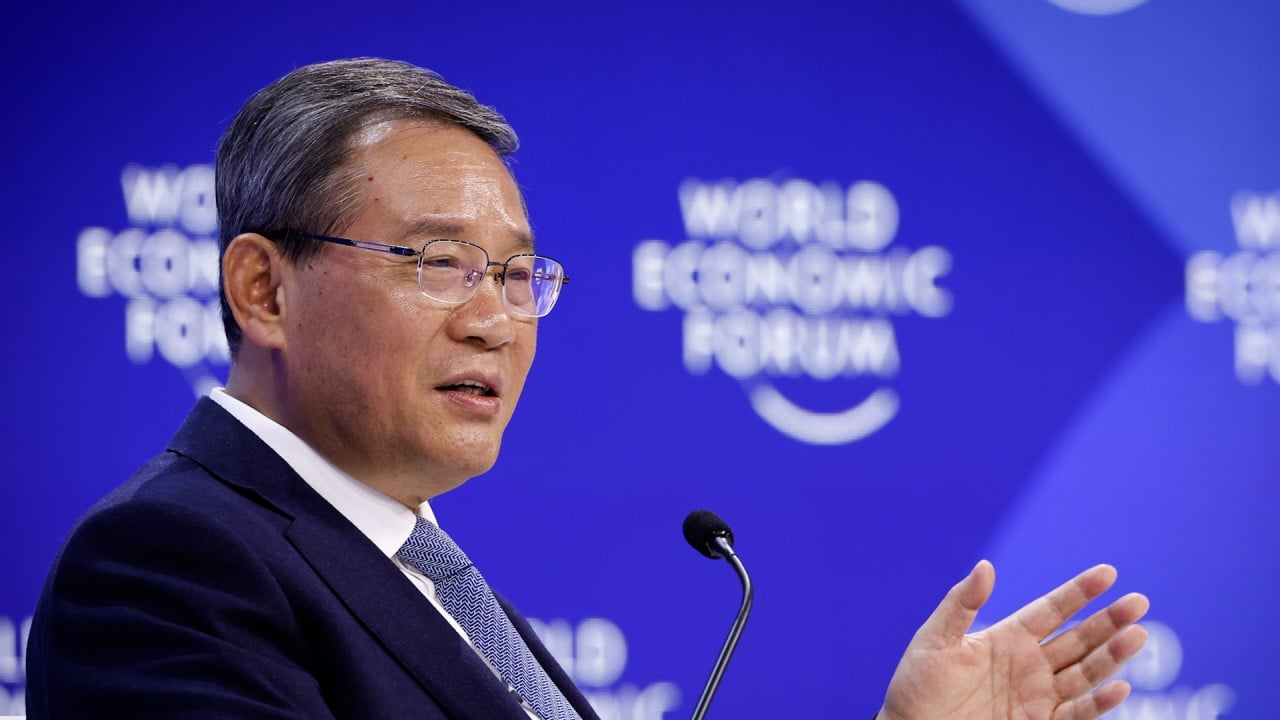
Hang Seng Index slides below 15,000-point psychological level to lowest since October 2022 on losses in Tencent, AIA
- Chinese lenders retained one- and five-year loan prime rates at this month’s setting in another disappointment for borrowers and investors
- Hang Seng Index has lost more than 12 per cent this year in the market’s worst start to a year since 2016
The Hang Seng Index slid 2.3 per cent to 14,961.18 on Monday, a psychological threshold seen during the October 2022 slump, before China abandoned its zero-Covid policy the following month. The Hang Seng Tech Index sank 3 per cent.
On the mainland’s bourses, the declines were sharper. The Shanghai Composite Index fell 2.7 per cent to a level not seen since April 2020, while the all-share Shenzhen Composite Index plunged 4.5 per cent.
All but three out the 82 index members dropped. Tencent tumbled 3.3 per cent to HK$262.20, Meituan lost 4.7 per cent to HK$65.40 and Baidu dropped 3.6 per cent to HK$95.60, leading steep declines among Chinese tech leaders. China Resources Land crashed 11 per cent to HK$20.50, and peer Longfor retreated 10 per cent to HK$7.92.
Electric-car maker BYD slipped 2.4 per cent to HK$190.90, while Li Auto slid 5 per cent to HK$104.70. Among financial companies, insurer AIA lost 2.2 per cent to HK$59.10 and HSBC weakened 0.3 per cent to HK$58.50.
China’s one-year loan prime rate stood at 3.45 per cent at the monthly setting, the People’s Bank of China (PBOC) said on Monday, unchanged since August last year. The five-year rate, a benchmark for mortgage financing, stayed at 4.2 per cent, unchanged since the last cut in June.
‘Why is China down again?’ Bewildered Hong Kong-based funds ask BofA to explain stock losses
The outcome dealt another knock to market confidence, reinforcing belief that Beijing will not deliver forceful stimulus measures, or overturn its crippling “three red lines” policy to rescue property developers and appease stock investors. Earlier this month, the PBOC kept its key policy rates on hold, against market consensus for a cut.
“It’s a capitulation,” said Dickie Wong, executive director at Kingston Securities. “No matter what the central bank does, it will not change the fact that foreign investors have zero confidence in this market now.”
China’s policy response continues to fall short of market expectations, offering no confidence or fight to overcome deflation risks, Barclays economists including Jian Chang said in a note to clients. Sluggish consumption and prolonged contraction in property investment will continue to weigh on 2024 growth, they added.
The market capitalisation losses in Chinese stocks listed in mainland China and Hong Kong this year alone have already snowballed to US$1 trillion, matching the sell-off in 2023, according to Bloomberg data. Funds have instead flowed elsewhere, fanning rallies in US and Japanese equities to record-highs.
Despite the seemingly bottomless slide, some veteran China fund managers reckon that the nation’s economic fundamentals are not as bad as stock prices suggest, according to Bank of America Securities.
Investors remain constructive on good Chinese stocks, strategists including Winnie Wu said in a recent note. More than half of the single-stock long ideas were in China, mainly in the internet sector, they added, citing meetings with clients.
Some technical signals also suggest that the selloff could be exaggerated. The Hang Seng Index’s 14-day relative strength indicator (RSI) dropped to 25.55 on Monday, with readings below 30 signalling stocks oversold and ripe for turnaround.
The last time the RSI reading dropped to this level, in October 2022, stocks surged 26.6 per cent over the next month in one of the market’s most powerful rebounds, according to Bloomberg data.
China stocks rout exposes risk from US$30 billion of ‘snowball’ derivatives
Some dip-buying by mainland and foreign investors helped pare losses on Monday. Global funds were net buyers of 1.05 billion yuan (US$146 million) worth of onshore-listed shares, halting six days of selling. Mainland Chinese funds picked up HK$656.2 million of Hong Kong-listed shares.
“From a technical perspective, the support level for the Hang Seng Index is around 14,600,” Kevin Liu, a strategist at CICC Research, said in a report on Sunday. “However, for the rebound to be sustained, it still needs timely and powerful fiscal support” from China, he added.
Markets were stronger elsewhere in Asia, tracking record US stock levels last week. Japan’s Nikkei 225 advanced 1.6 per cent and Australia’s S&P/ASX 200 gained 0.8 per cent, while South Korea’s Kospi declined 0.3 per cent.



